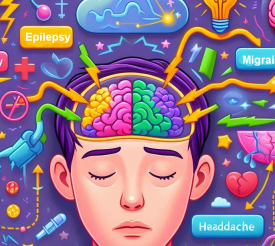Headache in Epilepsy Patients: Let’s talk about triggers.
The connection between headache and epilepsy is no secret. The challenge is that both symptoms often emerge from deep in the brain – an organ so incredibly complex that we’re really only starting to understand it.

A recent study investigated triggers of seizures and also headaches in patients with seizures. Might the same things be triggering both? If so, might this point to a connection in what causes both? (More information here: Exploring Shared Triggers and Potential Etiopathogenesis between Migraine and Idiopathic/Genetic Epilepsy)
The study was published this month in the journal Clinical Neurology and Neurosurgery. 809 patients who had epilepsy were studied – in this case, patients who had genetic related epilepsy or epilepsy with no known other cause (idiopathic).
Researchers found that there were indeed some similar triggers. Patients most often cited stress as a trigger for both seizures and headache. As we’ve talked about before, “stress” is not a simple cause – stress is, in fact, related to all kinds of physical and lifestyle factors, which makes it very difficult to study.
But that brings us to the second most commonly reported trigger for both – sleep deprivation. And this was related to #3 on the epilepsy list, fatigue.
All of these things could speak to getting out of your normal routine and not getting enough rest. That’s not to say the patient is to blame necessarily – there are 100 reasons this may occur, many of them completely out of our control, as we all know from experience.
One more interesting note. Patients with migraine and epilepsy were also more likely to have menstruation-triggered seizures (catamenial epilepsy). This naturally makes researchers ask questions about hormone fluctuations and both conditions. And yes – in some women sleep problems do go along with that time of the month.
The researchers in this study were especially interested in asking questions about a shared cause of headache/migraine and epilepsy. But there’s a practical point here too. Patients and their doctors can fight back by focusing on these triggers – in particular, sleep schedules. That may mean identifying another condition (such as a sleep´disorder), or working on changing environmental or lifestyle factors that can improve sleep. For some people, improving sleep may mean a significant lessening of other symptoms.
